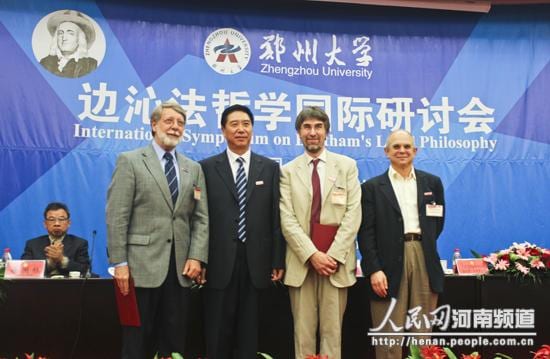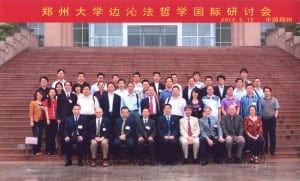Bentham in China
By Tim Causer, on 22 May 2012
Dr Michael Quinn reports on a recent trip to China:
On 12 and 13 May 2012, what was almost certainly the first Chinese conference dedicated to the study of Jeremy Bentham was hosted by the Law School of Zhengzhou University. Professor Philip Schofield and Dr Michael Quinn from the Bentham Project were joined in attending by Professor David Lieberman from the University of California, Berkeley, Professor Gerald Postema from the University of North Carolina at Chapel Hill, and Dr Emmanuelle de Champs from the University of Paris VIII and the Centre Bentham.
The conference proved to be a stimulating intellectual exchange, as both Chinese and Western scholars presented research on Bentham, before an audience of academics and students. Professor Schofield contributed both a lecture on Bentham’s critique of natural rights, in which he constructed a Benthamic response to contemporary critics of utilitarianism, such as John Rawls, and a paper based on his current editorial work on Bentham’s disinclination to regulate in matters of taste, particularly sexual taste. Professor Lieberman lectured on the idea of the mixed constitution, and read a fascinating paper on the connections between Bentham’s enthusiasm for codification and his democratic theory. Dr de Champs revealed the extent to which the early Bentham self-identified as an active citizen in a European Republic of Letters, and Dr Quinn discussed some of the tensions involved in responding to the pains experienced by an illiberal majority in consequence of the proposed decriminalization of ‘harmless’ actions to which they objected. The Chinese audience responded enthusiastically to the lecture by Professor Postema on ‘The Ethos of Law’, which stressed the individual and collective responsibility for creating an environment in which power, public or private, was held consistently to account. Dr Chen Jinghui presented a paper on Hart’s ‘Content-Independent Reasons’; Professor Guodong Xu explored the connections between Epicureanism and Utilitarianism; Dr Hongguo Chen investigated Bentham’s treatment of William Blackstone; Dr Danhong Wu painstakingly reviewed Bentham’s exhaustive discussion of the law of evidence; Professor Yanxin Su revealed the extent to which Bentham’s legal thought was influenced by his knowledge of Roman law; Professor Honghai Li sought to rehabilitate common law, in opposition to Bentham’s pejorative appellation ‘dog law’; and Professor Xiaobo Zhai presented a ground-breaking paper on Bentham’s ‘natural arrangement’. Professors Schofield, Lieberman and Postema were appointed honorary professors of Zhengzhou University, and Professor Schofield took part with the President of the University in inaugurating the new Bentham Centre at the University, under its Director Professor Xiaobo Zhai.

Professors Gerald Postema, Philip Schofield, and David Lieberman receive honorary professorships from Zhengzhou University
A fulsome tribute and accompanying thanks must be paid to the superb hospitality afforded by Zhengzhou University. All the foreign guests left harbouring wonderful memories of their time in China, and with the firm intention of broadening and deepening the new relationships forged during the trip. Their only regret concerned the recognition that they might never again be able to eat Chinese food in Europe or America: it’s just not the same as Chinese food in China!
We feel sure that Jeremy would be happy to know of the developing interest in his thought in a country with one fifth of the world’s population, and would be anxious to promote the translation of his works into Chinese.
 Close
Close



